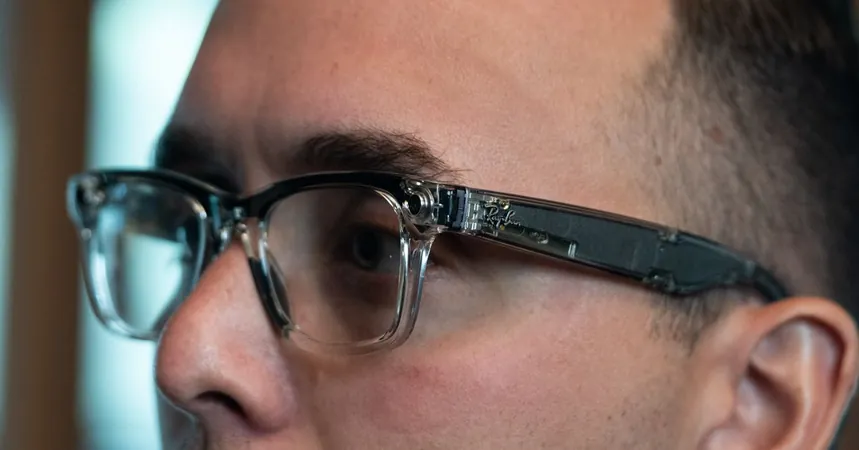
Step Into Meta's Future: Will Camera Glasses Redefine Privacy and Social Interaction?
2024-09-28
Author: Ken Lee
As I roamed Meta's sprawling Menlo Park campus, I felt as though I had stepped into a sci-fi movie. In addition to the numerous security cameras, a new era of technology was staring right back at me — smart glasses. Specifically, I encountered the Ray-Ban Meta smart glasses, a product that symbolizes Meta’s ambitious vision where wearable tech becomes ubiquitous and deeply ingrained in our daily lives.
During this year's Connect conference, I was inundated with innovations featuring cameras across virtually every hardware product on display. From the newly updated Ray-Ban smart glasses to the Quest 3S virtual reality headset, and Meta’s prototype Orion AR glasses, it was clear: Meta wants us to adopt a new way of seeing and sharing the world. Zuckerberg himself referred to the Orion AR glasses as a 'time machine,' offering a tantalizing glimpse into what full-fledged augmented reality could soon look like, even if commercial availability is still a while off.
Yet, amidst the allure of this future, I found myself feeling uneasy. As I noted the presence of Ray-Ban glasses all around the campus — equipped with a 12MP camera and an indicator light — I couldn't shake off the nagging feeling that my privacy was at risk. The bright light signals when someone is recording, theoretically providing reassurances. But instead of comforting me, it ramped up my anxiety, making me hyper-aware of who might be capturing footage of my every move.
When I finally slipped on a pair of these smart glasses, my perspective shifted entirely. Suddenly, I felt compelled to capture moments, realizing how easy it was to take pictures or videos from my viewpoint. This technology allows for spontaneous documentation of experiences without the cumbersome need to navigate through various apps or elements on a smartphone, potentially transforming how we share our realities with one another.
However, this ease of use leads to an unsettling question: What happens when everyone can record anything, anywhere, at any moment? The advent of camera phones already exposed us to ethical dilemmas surrounding privacy and consent. The ability to instantaneously share moments online raises the stakes even higher. While it may be a joy to capture joyous moments, will we be comfortable if our faces end up in someone else's viral TikTok compilation without our knowledge?
The implications extend beyond mere privacy. Cameras in prescription glasses pose unique concerns. For those who rely on vision aids, the concept of wearing smart glasses could lead to uncomfortable situations — say, using a public restroom while being digitally 'on.' While current models are largely designed to look like stylish sunglasses, Meta could push further towards making these glasses the standard everyday accessory. Are we ready for that?
Despite these concerns, there’s undeniable excitement over the capability of these devices. Capturing precious, candid moments — particularly for new parents witnessing their children grow — becomes far simpler. But there are also alarming possibilities we must confront as sophisticated facial recognition technologies continue to advance.
Ultimately, while Meta may be leading the charge into this technologically enhanced future, we must tread carefully. The Ray-Ban Meta glasses may be awe-inspiring gadgets, but their success will hinge on broader societal acceptance. Will personal privacy take a backseat to convenience, or will consumers demand safeguards against an overly intrusive world?
As we stand on the precipice of this new age of connectedness through smart glasses, I can’t help but wonder: Are we truly ready for a society where everyone wears cameras, and what might this mean for our shared human experience? The journey is just beginning, and it promises to be anything but dull.



 Brasil (PT)
Brasil (PT)
 Canada (EN)
Canada (EN)
 Chile (ES)
Chile (ES)
 España (ES)
España (ES)
 France (FR)
France (FR)
 Hong Kong (EN)
Hong Kong (EN)
 Italia (IT)
Italia (IT)
 日本 (JA)
日本 (JA)
 Magyarország (HU)
Magyarország (HU)
 Norge (NO)
Norge (NO)
 Polska (PL)
Polska (PL)
 Schweiz (DE)
Schweiz (DE)
 Singapore (EN)
Singapore (EN)
 Sverige (SV)
Sverige (SV)
 Suomi (FI)
Suomi (FI)
 Türkiye (TR)
Türkiye (TR)